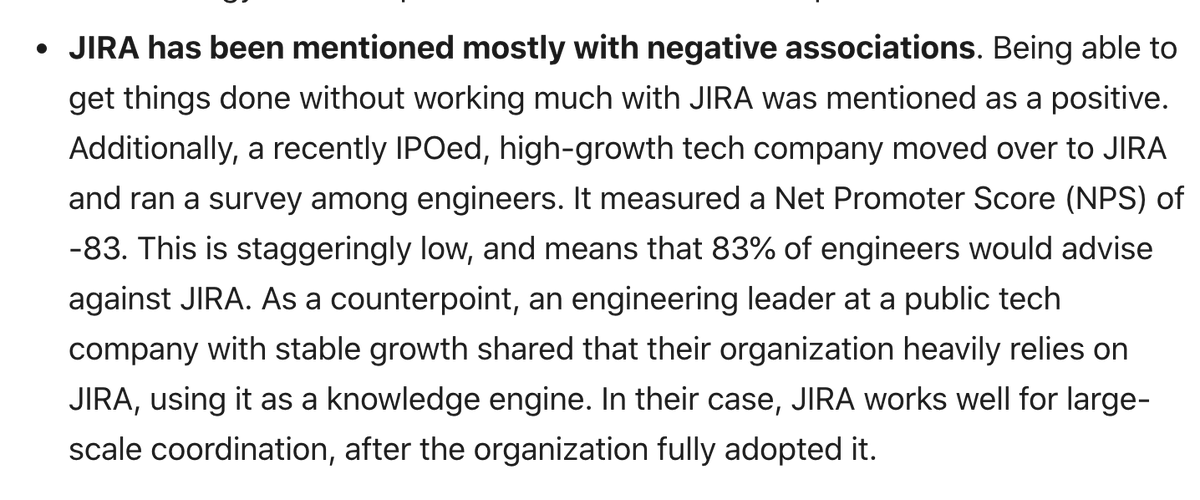
A recently IPO'd company mandated moving over to JIRA because... well, reporting, and lack of options. So they did.
As a data-driven company, they ran a survey afterward. The NPS for JIRA among engineers: -83. This means that 83% of devs would recommend *against* JIRA (!!).
As a data-driven company, they ran a survey afterward. The NPS for JIRA among engineers: -83. This means that 83% of devs would recommend *against* JIRA (!!).
Now I'm not saying JIRA is terrible... but it requires a long, and painful learning curve that most people don't tolerate. And, let's be honest: they hate.
It's also why companies like @linear are capturing the market with startups and places where engineers are decision makers.
It's also why companies like @linear are capturing the market with startups and places where engineers are decision makers.
JIRA also increasingly has a perception problem after years of treating decision-makers as their end users, not the engineers forced to use a tool to move things around.
Those engineers are now becoming decision-makers. And they want to desperately avoid JIRA, given the options.
Those engineers are now becoming decision-makers. And they want to desperately avoid JIRA, given the options.
As another fun fact, people at about 100 different companies shared details on how projects are run at docs.google.com/forms/d/1cQTc9…
JIRA was mentioned 13 times. *Only* in a negative context.
(Not saying there are teams who don't like it: but no one raved about it)
JIRA was mentioned 13 times. *Only* in a negative context.
(Not saying there are teams who don't like it: but no one raved about it)
Back to the company. They are engineering-led, (internally) transparent & a tech company.
Results are *so* uncomparably bad, and could indicate eng attrition, that on top of the usual (training, talk w vendor etc) they're also exploring moving off JIRA, at least for engineers.
Results are *so* uncomparably bad, and could indicate eng attrition, that on top of the usual (training, talk w vendor etc) they're also exploring moving off JIRA, at least for engineers.
This will be a challenge for JIRA.
They've captured the project management market, but piss off engineering users. And it's becoming risky to do so, especially for modern companies that look at data like this.
And JIRA can't afford to get locked out of tech/eng organizations.
They've captured the project management market, but piss off engineering users. And it's becoming risky to do so, especially for modern companies that look at data like this.
And JIRA can't afford to get locked out of tech/eng organizations.
The article is out on project management approaches after going through data from close to 100 companies. Here's the article, and the section on JIRA: newsletter.pragmaticengineer.com/p/project-mana…
Obviously, this is non-representative, but still, not flattering.
Obviously, this is non-representative, but still, not flattering.

A clarification on what a negative 83% NPS means: *at least* 83% of engineers recommend against it.
Due to how it’s calculated it could be:
83% against, 17% neutral
88% against, 7% neutral, 5% support
91% against, 1% neutral, 8% support
Such low NPS is rarely heard of
Due to how it’s calculated it could be:
83% against, 17% neutral
88% against, 7% neutral, 5% support
91% against, 1% neutral, 8% support
Such low NPS is rarely heard of
I just realised a year ago I wrote about what has *not* changed since 2010 in the sw dec industry: blog.pragmaticengineer.com/the-decade-in-…
Complaining about JIRA - but still adopting it, usually top-down - is still one of them.
Fees like we’re at an inflection point where this could change.
Complaining about JIRA - but still adopting it, usually top-down - is still one of them.
Fees like we’re at an inflection point where this could change.

• • •
Missing some Tweet in this thread? You can try to
force a refresh










